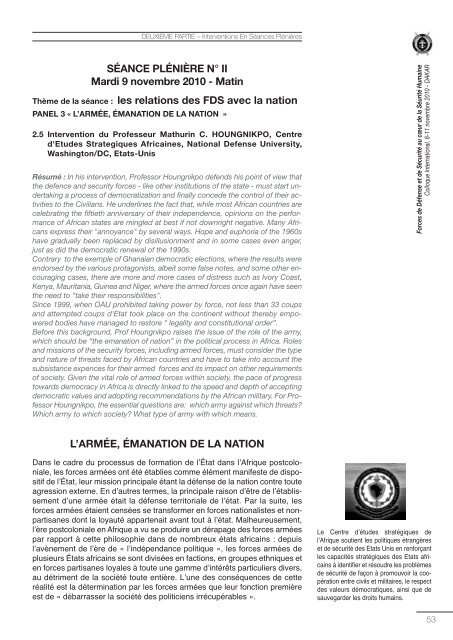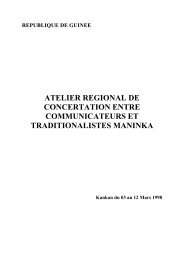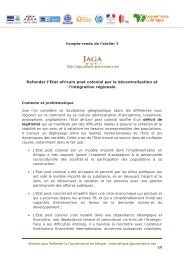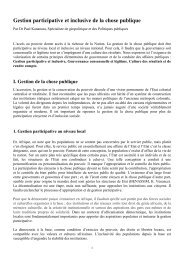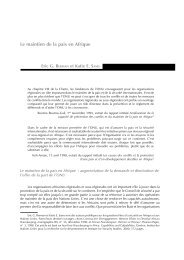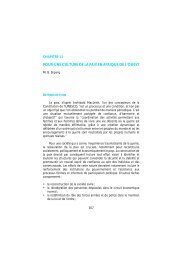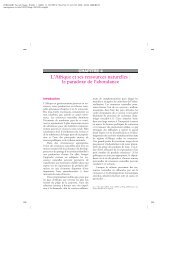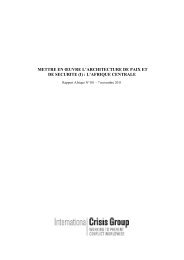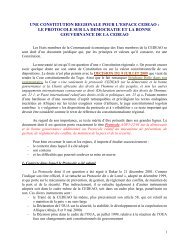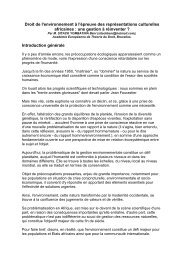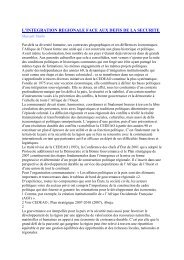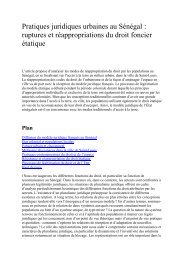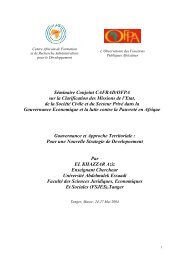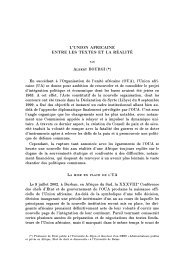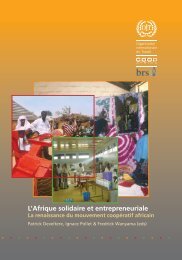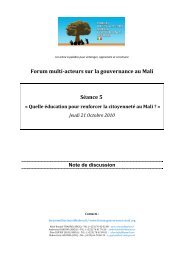Compendium - Fondation Charles Léopold Mayer pour le progrès ...
Compendium - Fondation Charles Léopold Mayer pour le progrès ...
Compendium - Fondation Charles Léopold Mayer pour le progrès ...
Create successful ePaper yourself
Turn your PDF publications into a flip-book with our unique Google optimized e-Paper software.
DEUXIÈME PARTIE – Interventions En Séances PlénièresSÉANCE PLÉNIÈRE N° IIMardi 9 novembre 2010 - MatinThème de la séance : <strong>le</strong>s relations des FDS avec la nationPANEL 3 « L’ARMÉE, ÉMANATION DE LA NATION »2.5 Intervention du Professeur Mathurin C. HOUNGNIKPO, Centred'Etudes Strategiques Africaines, National Defense University,Washington/DC, Etats-UnisRésumé : In his intervention, Professor Houngnikpo defends his point of view thatthe defence and security forces - like other institutions of the state - must start undertakinga process of democratization and finally concede the control of their activitiesto the Civilians. He underlines the fact that, whi<strong>le</strong> most African countries arece<strong>le</strong>brating the fiftieth anniversary of their independence, opinions on the performanceof African states are ming<strong>le</strong>d at best if not downright negative. Many Africansexpress their "annoyance" by several ways. Hope and euphoria of the 1960shave gradually been replaced by disillusionment and in some cases even anger,just as did the democratic renewal of the 1990s.Contrary to the exemp<strong>le</strong> of Ghanaian democratic e<strong>le</strong>ctions, where the results wereendorsed by the various protagonists, albeit some false notes, and some other encouragingcases, there are more and more cases of distress such as Ivory Coast,Kenya, Mauritania, Guinea and Niger, where the armed forces once again have seenthe need to "take their responsibilities".Since 1999, when OAU prohibited taking power by force, not <strong>le</strong>ss than 33 coupsand attempted coups d'Etat took place on the continent without thereby empoweredbodies have managed to restore " <strong>le</strong>gality and constitutional order”.Before this background, Prof Houngnikpo raises the issue of the ro<strong>le</strong> of the army,which should be “the emanation of nation” in the political process in Africa. Ro<strong>le</strong>sand missions of the security forces, including armed forces, must consider the typeand nature of threats faced by African countries and have to take into account thesubsistance expences for their armed forces and its impact on other requirementsof society. Given the vital ro<strong>le</strong> of armed forces within society, the pace of progresstowards democracy in Africa is directly linked to the speed and depth of acceptingdemocratic values and adopting recommendations by the African military. For ProfessorHoungnikpo, the essential questions are: which army against which threats?Which army to which society? What type of army with which means.Forces de Défense et de Sécurité au cœur de la Séurité HumaineColloque International, 8-11 novembre 2010 - DAKARL’ARMÉE, ÉMANATION DE LA NATIONDans <strong>le</strong> cadre du processus de formation de lʼÉtat dans lʼAfrique postcolonia<strong>le</strong>,<strong>le</strong>s forces armées ont été établies comme élément manifeste de dispositifde lʼÉtat, <strong>le</strong>ur mission principa<strong>le</strong> étant la défense de la nation contre touteagression externe. En dʼautres termes, la principa<strong>le</strong> raison dʼêtre de lʼétablissementdʼune armée était la défense territoria<strong>le</strong> de lʼétat. Par la suite, <strong>le</strong>sforces armées étaient censées se transformer en forces nationalistes et nonpartisanesdont la loyauté appartenait avant tout à lʼétat. Malheureusement,lʼère postcolonia<strong>le</strong> en Afrique a vu se produire un dérapage des forces arméespar rapport à cette philosophie dans de nombreux états africains : depuislʼavènement de lʼère de « lʼindépendance politique », <strong>le</strong>s forces armées deplusieurs États africains se sont divisées en factions, en groupes ethniques eten forces partisanes loya<strong>le</strong>s à toute une gamme dʼintérêts particuliers divers,au détriment de la société toute entière. Lʼune des conséquences de cetteréalité est la détermination par <strong>le</strong>s forces armées que <strong>le</strong>ur fonction premièreest de « débarrasser la société des politiciens irrécupérab<strong>le</strong>s ».Le Centre dʼétudes stratégiques delʼAfrique soutient <strong>le</strong>s politiques étrangèreset de sécurité des Etats Unis en renforçant<strong>le</strong>s capacités stratégiques des Etats africainsà identifier et résoudre <strong>le</strong>s problèmesde sécurité de façon à promouvoir la coopérationentre civils et militaires, <strong>le</strong> respectdes va<strong>le</strong>urs démocratiques, ainsi que desauvegarder <strong>le</strong>s droits humains.53


